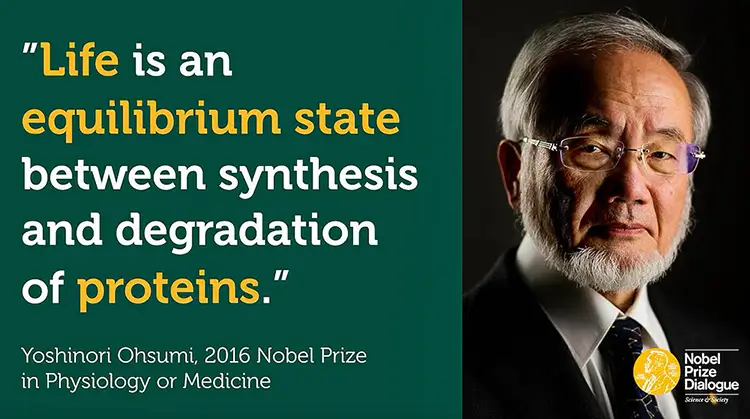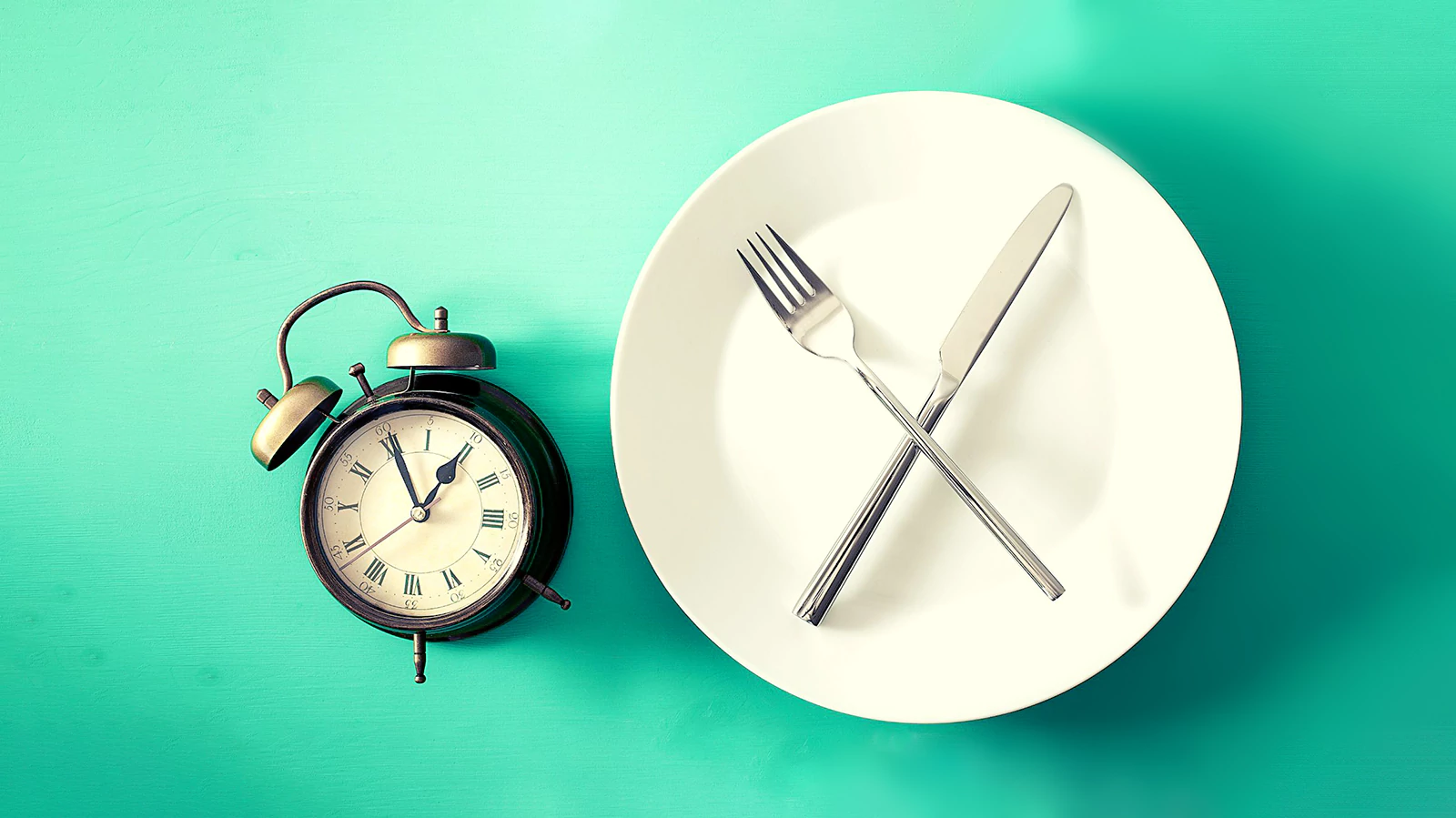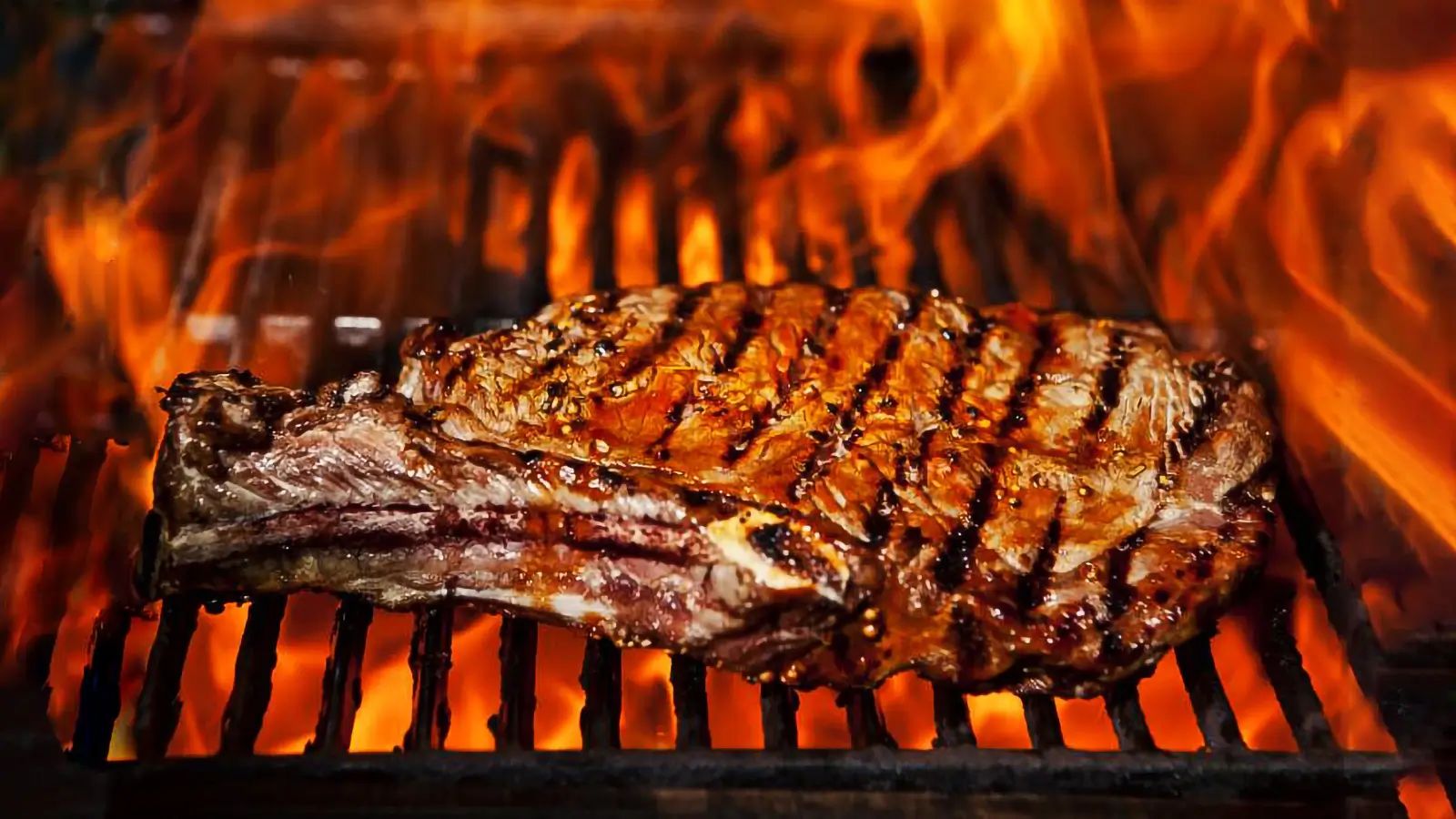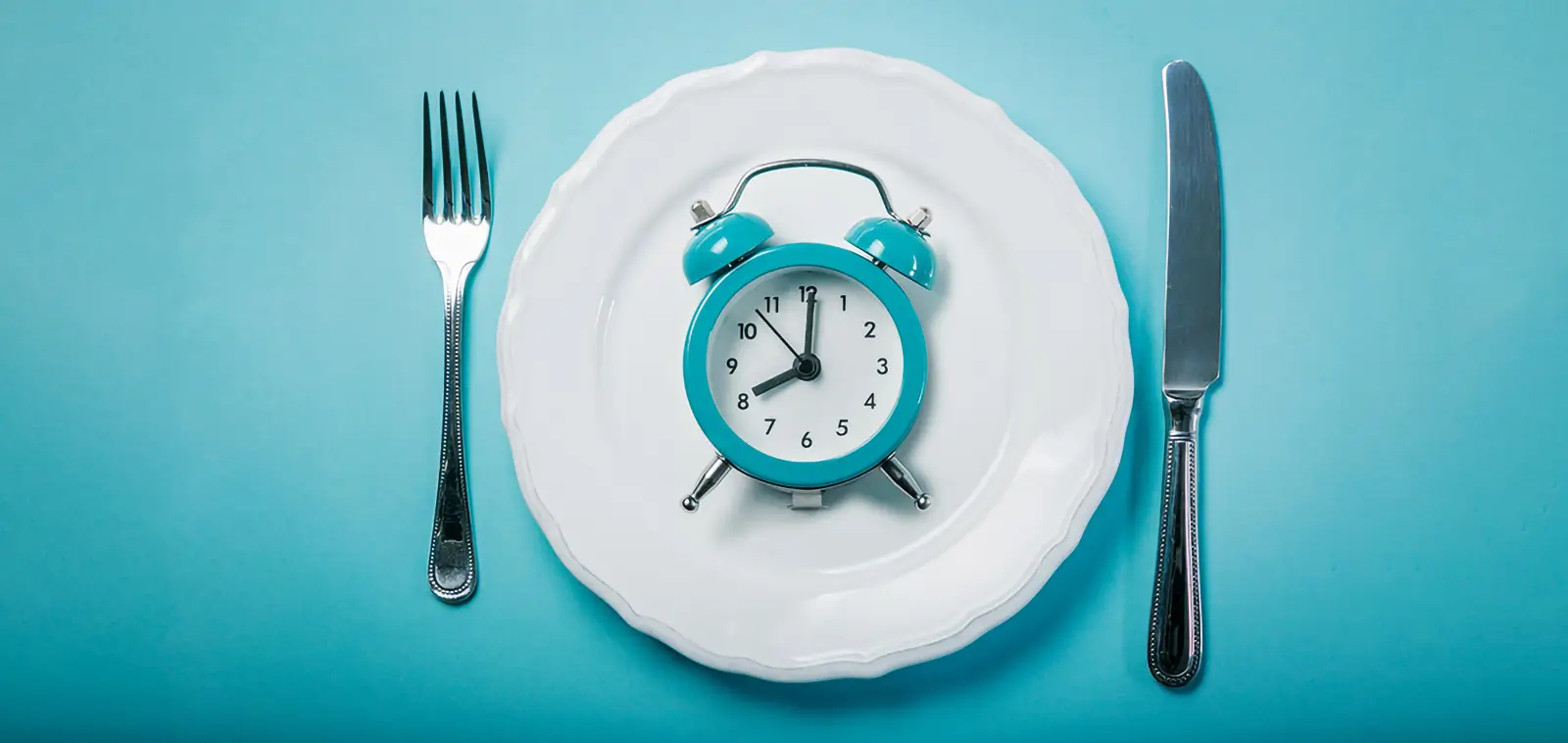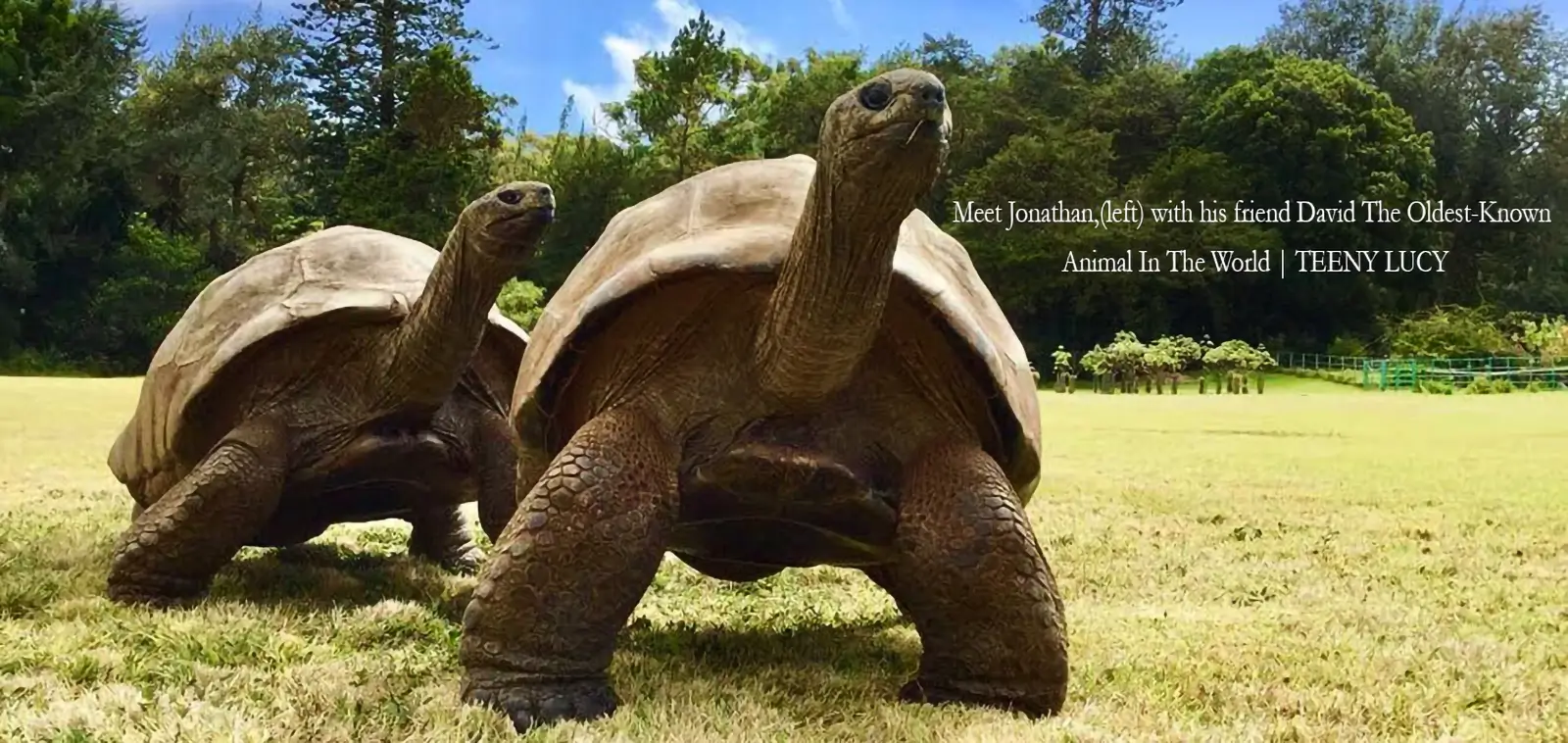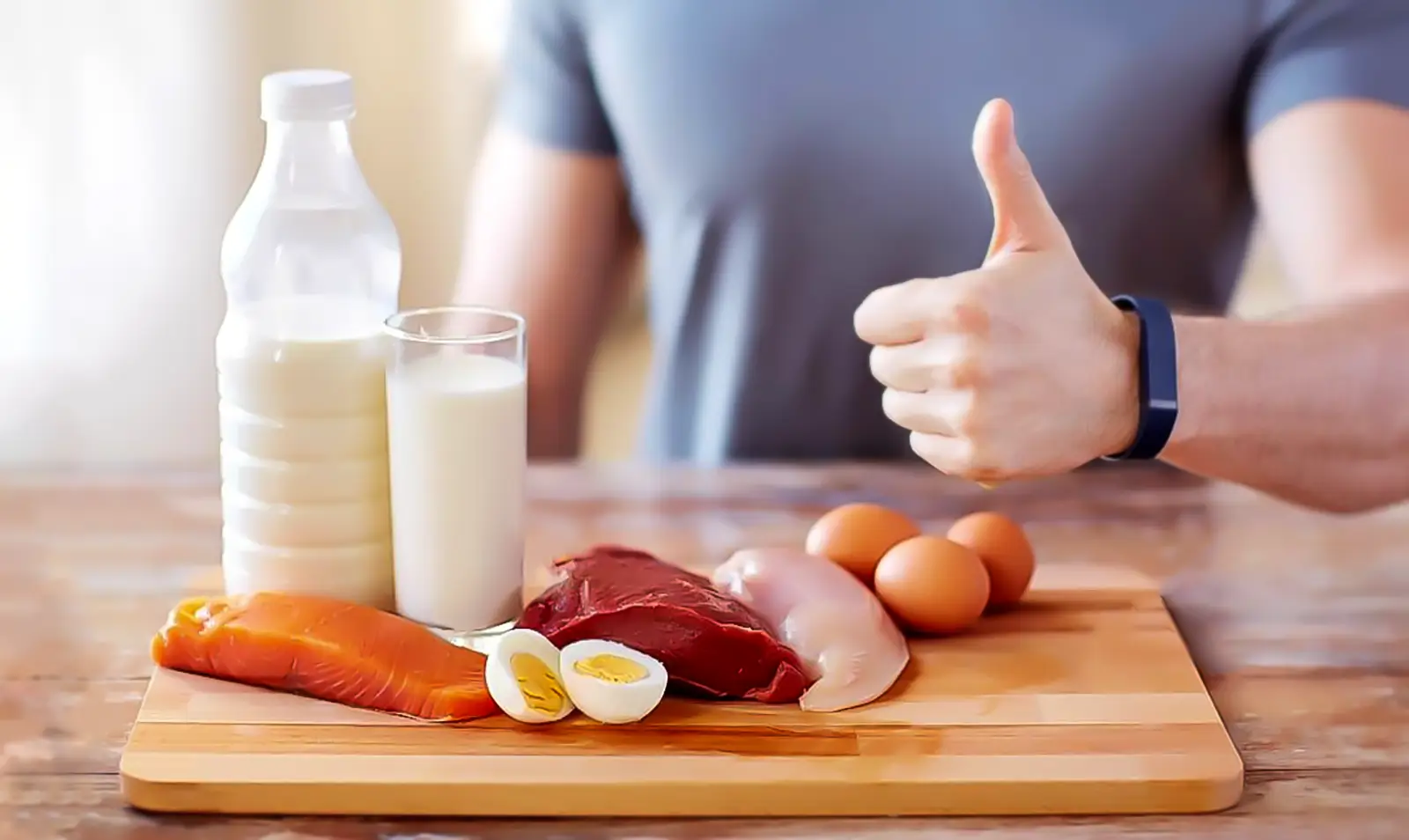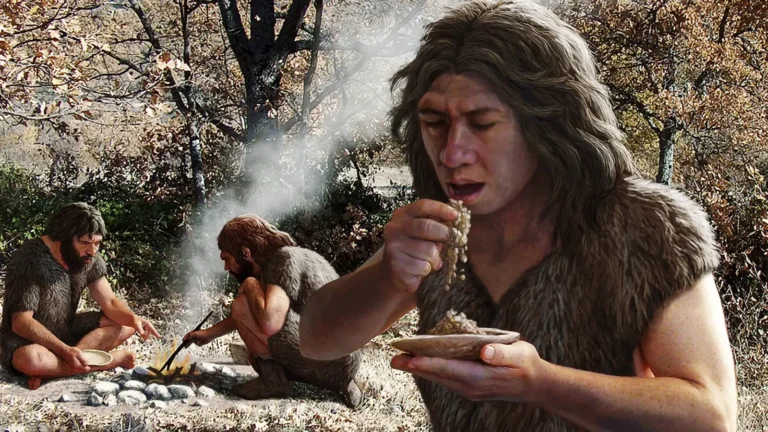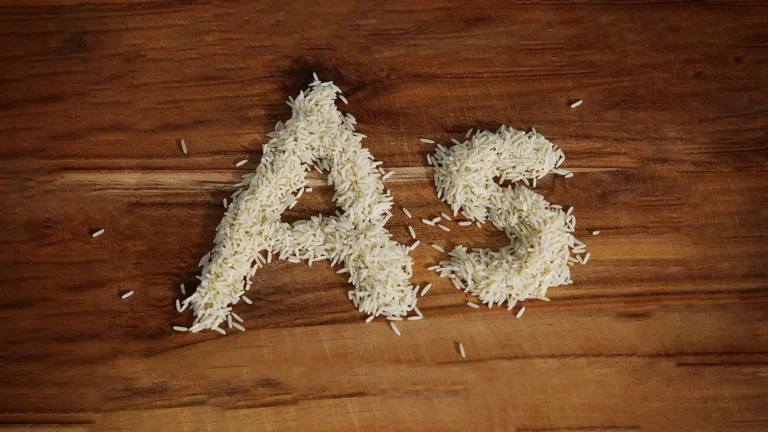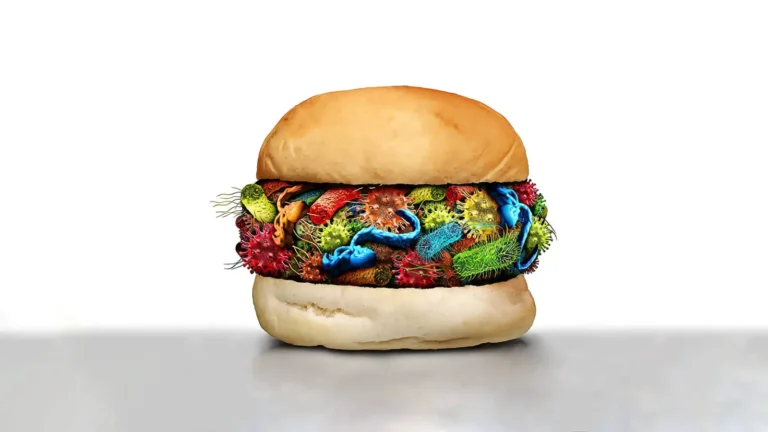La restricción de calorías, la Autofagia, la Longevidad, y la pérdida de masa Muscular
Todos queremos una cantidad considerable de masa muscular y un metabolismo rápido para poder comer más, pero la autofagia es lo que se ajusta a la biología evolutiva.
Milos Pokimica
Escrito por: Milos Pokimica
Revisado Médicamente Por: Dr. Xiùying Wáng, M.D.
Actualizado el 9 de junio de 2023Queremos tener tanta masa muscular como sea posible y un metabolismo rápido para poder comer más sin ganar peso, pero la biología evolutiva nos vuelve a decir lo que es saludable, y eso no es comer en exceso constantemente. A los animales en la naturaleza les cuesta mucho encontrar comida, por lo que un nivel básico de existencia es un mayor nivel de autofagia con ayuno intermitente y restricción calórica. Voy a utilizar una cita del sitio web del Instituto Nacional sobre el Envejecimiento del Departamento de Salud y Servicios Humanos de los Estados Unidos:
"Desde la década de 1930, los investigadores han constatado sistemáticamente que las ratas y ratones de laboratorio viven hasta un 40 por ciento más de lo habitual y también parecen ser más resistentes a las enfermedades relacionadas con el envejecimiento cuando se les alimenta con una dieta que contiene al menos un 30 por ciento menos de calorías de las que consumirían normalmente. Ahora los investigadores están estudiando si la restricción calórica afectará al envejecimiento de los monos y otros primates no humanos, y cómo lo hará."
En la actualidad contamos con un gran número de estudios en humanos (Fernández-Ruiz, 2017). La respuesta de restricción calórica existe en casi todas las especies analizadas hasta la fecha y probablemente evolucionó muy pronto en la historia de la vida en la Tierra como mecanismo para aumentar las posibilidades de sobrevivir a la escasez periódica. Existe una diferencia entre el ayuno y la restricción calórica prolongada, pero el mecanismo subyacente es el mismo, y la restricción calórica prolongará la esperanza de vida mucho más que el ayuno periódico, aunque incluso el ayuno periódico tendrá efectos beneficiosos sobre la longevidad.
Los beneficios provienen de dos razones principales. Hay otros beneficios como:
- mejora de la sensibilidad a la insulina
- regular las condiciones inflamatorias del organismo
- impedir la formación de células cancerosas
- desintoxicante
- mejorar los hábitos alimentarios
- equilibrio hormonal.
Sin embargo, hay dos razones principales a nivel celular que subrayan todos los demás beneficios que se derivan de ellas.
En primer lugar, cuando ayunamos, los niveles sanguíneos de insulina descienden significativamente, y los niveles sanguíneos de la hormona del crecimiento pueden aumentar hasta 5 veces. La insulina y la hormona del crecimiento desempeñan papeles antagónicos entre sí. Cuando una está elevada, la otra estará baja. Cuando nos vamos a dormir ayunamos durante 10 horas, la insulina baja y la HGH (hormona del crecimiento humano) sube. Cuando la HGH aumenta, crecemos, especialmente si estamos en la pubertad. La HGH estimula el crecimiento, la reproducción celular y la regeneración celular. Por tanto, es esencial en el desarrollo humano.
En segundo lugar, cuando ayunamos nuestras células inician importantes procesos de reparación celular y cambian los genes que expresan. Empezamos a regenerarnos y permitimos la limpieza y desintoxicación del organismo. Una de las razones por las que los enfermos tienen poco apetito es que están en un proceso de regeneración intensiva. En términos médicos esa regeneración se llama autofagia.
En griego antiguo, “phagy” significa comer y “auto” significa uno mismo, por lo que autofagia significa literalmente «autoconsumo». Te comes a ti mismo todos los días. Cuando cualquier célula de nuestro cuerpo muere, no se desperdicia. Lo que ocurre es un proceso de reciclaje. La autofagia es un método fisiológico completamente natural del cuerpo que se encarga de la destrucción de las células. Controla la homeostasis o el funcionamiento regular mediante la degradación y destrucción de proteínas y la renovación de los orgánulos celulares destruidos para la formación de nuevas células. Durante el estrés celular (privación de nutrientes), el proceso de autofagia se incrementa.
La autofagia también tiene la capacidad de destruir las células en determinadas condiciones. Existe una forma de muerte celular programada y otra inducida por la autofagia. Son dos tipos diferentes. La muerte celular programada se denomina comúnmente apoptosis. La autofagia se denomina muerte celular programada no apoptótica con vías y mediadores diferentes de la apoptosis. Además, esta es la clave de la restricción calórica y el ayuno. Si la célula es precancerosa, por ejemplo, o está dañada o mutada de alguna manera, la muerte celular por autofagia ayudará a nuestro cuerpo a limpiarse.
Después del agotamiento del glucógeno, entraremos en un aumento de la autofagia, y nuestro cuerpo se apoyará en gran medida en los aminoácidos y el catabolismo de proteínas para la creación de energía. Se utilizarán aminoácidos y se perderá parte de la masa muscular.
Además, es algo bueno.
Nuestro organismo es mucho más inteligente de lo que pensamos. Nuestro corazón también es el músculo, pero no se tocaría. Primero va el glucógeno, luego la grasa, después el músculo y luego los órganos vitales, y entonces morimos de desnutrición. Es un plan brillante para mantener la vida a través del hambre. Si hay una célula "mala" y una célula "buena" y algunas de las células necesitan "ir" a por energía, la primera en la fila es la célula mala. Lo primero de lo que hay que deshacerse es de las partes del sistema que puedan estar dañadas o viejas. Las partes ineficaces. Se cree que la ausencia de autofagia es una de las principales razones de la acumulación de células dañadas, y esto puede provocar graves complicaciones de salud. Si empezamos gravemente dañados por la quimioterapia u otras toxinas, los ciclos de ayuno pueden generar, literalmente, un sistema inmunitario completamente nuevo.
El ejercicio por sí mismo es capaz de aumentar la autofagia en una situación en la que la autofagia ya se produce. Cuanto más intenso sea el ejercicio, más eficaz será. Sin embargo, si comemos y hacemos ejercicio, el ejercicio por sí solo no sería beneficioso.
La forma más rápida de desactivar la autofagia es comer grandes cantidades de proteína completa. Lo que esto hará es estimular el IGF-1 (factor de crecimiento similar a la insulina 1) y el mTOR (rapamicina), que son potentes inhibidores de la autofagia. El IGF-1 (factor de crecimiento insulínico) es en cierto modo responsable del crecimiento muscular. Sin embargo, el efecto secundario catastrófico del IGF-1 es el cáncer. Lo mejor es limitar las proteínas a unos 50 a 70 gramos al día, en función de la masa corporal magra. Cuando ingerimos grandes cantidades de proteína, nuestro hígado lo detecta, y la respuesta es:
”Oye, cultivemos cosas, ahora tenemos todos los aminoácidos esenciales”.”
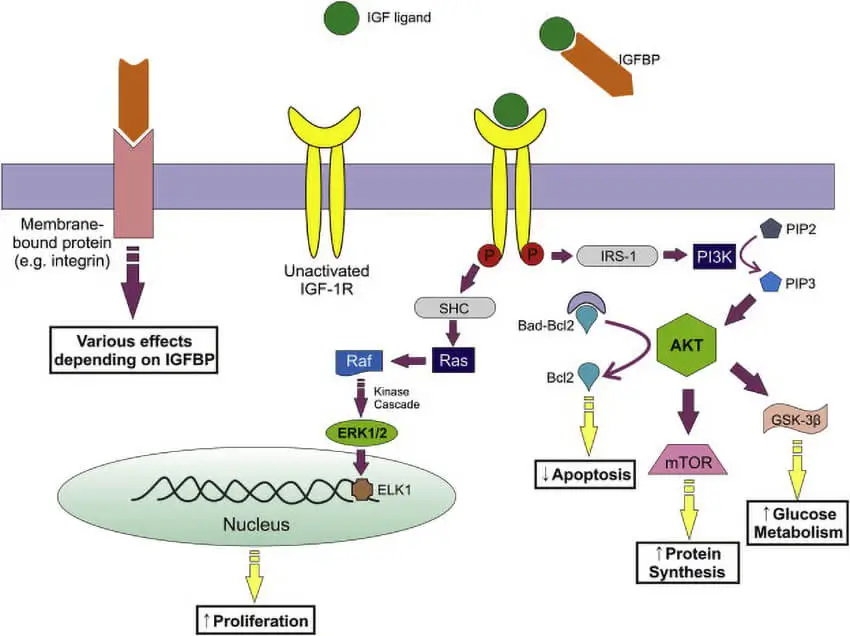
Comienza a bombear IGF-1. En el hígado en estado de ayuno, la unión de la GH (hormona del crecimiento) disminuye, por lo que queda más GH en el torrente sanguíneo. En la restricción proteica, se mantienen los receptores de GH pero no para IGF-1.
Para evitar la pérdida de músculo durante la restricción calórica y la dieta, y para aumentar los beneficios de la restricción calórica, lo mejor es realizar un entrenamiento de resistencia moderado. Esto no evitará la pérdida de músculo pero será beneficioso hasta cierto punto (Cava y otros, 2017).
Otra forma es evitar los alimentos no veganos o, en otras palabras, las fuentes de proteínas "completas" en grandes cantidades.
Cuando ingerimos una fuente incompleta de proteínas, es decir, que carece de algunos de los aminoácidos esenciales, no señalará la liberación de IGF-1 al mismo nivel. No se trata sólo de la cantidad total de proteína consumida, sino también de la fuente (Allen et al., 2002).
Si eres vegano y comes fuentes completas de proteína como la soja, anularás el beneficio. Esto se debe al perfil proteico. Los veganos, por ejemplo, que comen de 7 a 18 raciones de soja al día pueden acabar con niveles circulantes de IGF-1 relativos a los que comen carne. Esto se debe a que la soja contiene proteínas completas. Otras plantas también tienen proteínas de alta calidad. El alto nivel de consumo de proteínas en la dieta tiene otros efectos negativos a pesar de todo. Además, si su único objetivo es evitar la pérdida de masa muscular durante la dieta y no está interesado en la longevidad, querrá aumentar su ingesta de proteínas.
La buena noticia es que podemos utilizar la autofagia para limpiar nuestra base genética, la mala es que ya no lo hacemos. En el pasado la naturaleza nos forzaba al no proporcionarnos suficientes recursos. Hoy comemos con regularidad y aunque pasemos hambre eso no durará lo suficiente como para agotar nuestras reservas de glucógeno.
Referencias:
- Fernández-Ruiz I. (2017). Metabolismo: Restricción calórica para un envejecimiento saludable. Reseñas de Nature. Cardiología, 14(4), 190. https://doi.org/10.1038/nrcardio.2017.26
- Cava, E., Yeat, N. C., & Mittendorfer, B. (2017). Preservar el músculo sano durante la pérdida de peso. Avances en nutrición, 8(3), 511-519. https://doi.org/10.3945/an.116.014506
- Allen, N. E., Appleby, P. N., Davey, G. K., Kaaks, R., Rinaldi, S., & Key, T. J. (2002). The associations of diet with serum insulin-like growth factor I and its main binding proteins in 292 women meat-eaters, vegetarians, and vegans. Epidemiología, biomarcadores y prevención del cáncer : una publicación de la Asociación Americana para la Investigación del Cáncer, copatrocinada por la Sociedad Americana de Oncología Preventiva., 11(11), 1441-1448.[PubMed]
- Welton, S., Minty, R., O’Driscoll, T., Willms, H., Poirier, D., Madden, S. y Kelly, L. (2020). Ayuno intermitente y pérdida de peso: revisión sistemática. Médico de familia canadiense Medecin de famille canadien, 66(2), 117-125.[PubMed]
- Zouhal, H., Saeidi, A., Salhi, A., Li, H., Essop, M. F., Laher, I., Rhibi, F., Amani-Shalamzari, S., & Ben Abderrahman, A. (2020). Exercise Training and Fasting: Current Insights. Revista de acceso abierto de medicina deportiva, 11, 1-28. https://doi.org/10.2147/OAJSM.S224919
- Denduluri, S. K., Idowu, O., Wang, Z., Liao, Z., Yan, Z., Mohammed, M. K., Ye, J., Wei, Q., Wang, J., Zhao, L., & Luu, H. H. (2015). Factor de crecimiento similar a la insulina (IGF) de señalización en la tumorigénesis y el desarrollo de resistencia a los medicamentos contra el cáncer. Genes y enfermedades, 2(1), 13-25. https://doi.org/10.1016/j.gendis.2014.10.004
Contenidos Relacionados
¿Tienes alguna duda acerca de la nutrición y la salud?
Me encantaría saber de usted y responderlas en mi próxima publicación. Agradezco sus aportes y opiniones y espero tener noticias suyas pronto. También te invito a síguenos en Facebook, Instagram y Pinterest para más contenidos sobre dieta, nutrición y salud. Puedes dejar un comentario allí y conectar con otros entusiastas de la salud, compartir tus consejos y experiencias, y recibir apoyo y ánimo de nuestro equipo y nuestra comunidad.
Espero que este post le haya resultado informativo y ameno y que esté preparado para aplicar los conocimientos adquiridos. Si le ha resultado útil, por favor compártelo con tus amigos y familiares que también podrían beneficiarse de ella. Nunca se sabe quién puede necesitar orientación y apoyo en su camino hacia la salud.
– También Te Puede Interesar –

Aprenda Sobre Nutricion
Milos Pokimica es doctor en medicina natural, nutricionista clínico, escritor sobre salud médica y nutrición y asesor en ciencias de la nutrición. Autor de la serie de libros Go Vegan? Revisión de la Ciencia, también dirige el sitio web sobre salud natural GoVeganWay.com.
Descargo De Responsabilidad Médica
GoVeganWay.com le ofrece reseñas de las últimas investigaciones relacionadas con la nutrición y la salud. La información proporcionada representa la opinión personal del autor y no pretende ni implica sustituir el asesoramiento, diagnóstico o tratamiento médico profesional. La información proporcionada tiene fines informativos únicamente y no pretende sustituir la consulta, el diagnóstico y/o el tratamiento médico de un médico o proveedor de atención médica calificado.NUNCA ignore el CONSEJO MÉDICO PROFESIONAL O RETRASAR la BÚSQUEDA de TRATAMIENTO MÉDICO a CAUSA DE ALGO QUE HAYA LEÍDO EN O accesibles a TRAVÉS de GoVeganWay.com
NUNCA APLICAR CUALQUIER cambio de ESTILO de vida O CAMBIOS EN su totalidad COMO UNA CONSECUENCIA DE ALGO QUE HA LEÍDO EN GoVeganWay.com ANTES de CONSULTAR con LICENCIA PROFESIONAL MÉDICO.
En el caso de una emergencia médica, llame a un médico o al 911 inmediatamente. GoVeganWay.com no se recomienda ni aprueba ninguna de los grupos, las organizaciones, las pruebas, los médicos, productos, procedimientos, opiniones u otra información que pueda ser mencionado en el interior.
Selecciones del editor –
Milos Pokimica es escritor especializado en salud y nutrición y asesor en ciencias nutricionales. Autor de la serie de libros Go Vegan? Revisión de la Ciencia, también dirige el sitio web sobre salud natural GoVeganWay.com.
Últimos artículos -
Top Noticias De Salud — ScienceDaily
- The overlooked nutrition risk of Ozempic and Wegovyen febrero 4, 2026
Popular weight-loss drugs like Ozempic and Wegovy can dramatically curb appetite, but experts warn many users are flying blind when it comes to nutrition. New research suggests people taking these medications may not be getting enough guidance on protein, vitamins, and overall diet quality, increasing the risk of muscle loss and nutrient deficiencies.
- A 25-year study found an unexpected link between cheese and dementiaen febrero 4, 2026
A massive Swedish study tracking nearly 28,000 people for 25 years found an unexpected link between full-fat dairy and brain health. Among adults without a genetic risk for Alzheimer’s, eating more full-fat cheese was associated with a noticeably lower risk of developing the disease, while higher cream intake was tied to reduced dementia risk overall. The findings challenge decades of low-fat dietary advice but come with important caveats.
- MIT’s new brain tool could finally explain consciousnessen febrero 4, 2026
Scientists still don’t know how the brain turns physical activity into thoughts, feelings, and awareness—but a powerful new tool may help crack the mystery. Researchers at MIT are exploring transcranial focused ultrasound, a noninvasive technology that can precisely stimulate deep regions of the brain that were previously off-limits. In a new “roadmap” paper, they explain how this method could finally let scientists test cause-and-effect in consciousness research, not just observe […]
- Why heart disease risk in type 2 diabetes looks different for men and womenen febrero 4, 2026
Scientists are digging into why heart disease risk in type 2 diabetes differs between men and women—and sex hormones may be part of the story. In a large Johns Hopkins study, men with higher testosterone had lower heart disease risk, while rising estradiol levels were linked to higher risk. These hormone effects were not seen in women. The results point toward more personalized approaches to heart disease prevention in diabetes.
- Sound machines might be making your sleep worseen febrero 4, 2026
Sound machines may not be the sleep saviors many believe. Researchers found that pink noise significantly reduced REM sleep, while simple earplugs did a better job protecting deep, restorative sleep from traffic noise. When pink noise was combined with outside noise, sleep quality dropped even further. The results suggest that popular “sleep sounds” could be doing more harm than good—particularly for kids.
- This unexpected plant discovery could change how drugs are madeen febrero 3, 2026
Plants make chemical weapons to protect themselves, and many of these compounds have become vital to human medicine. Researchers found that one powerful plant chemical is produced using a gene that looks surprisingly bacterial. This suggests plants reuse microbial tools to invent new chemistry. The insight could help scientists discover new drugs and produce them more sustainably.
- A hidden cellular process may drive aging and diseaseen febrero 3, 2026
As we age, our cells don’t just wear down—they reorganize. Researchers found that cells actively remodel a key structure called the endoplasmic reticulum, reducing protein-producing regions while preserving fat-related ones. This process, driven by ER-phagy, is tied to lifespan and healthy aging. Because these changes happen early, they could help trigger later disease—or offer a chance to stop it.
PubMed, #Dieta vegana –
- Diet type and the oral microbiomeen febrero 2, 2026
CONCLUSION: The diet-oral microbiome-systemic inflammation axis is bidirectional and clinically relevant. Understanding both direct ecological regulation and indirect metabolic effects is essential to support precision nutrition strategies aimed at maintaining oral microbial balance and systemic inflammatory risk mitigation.
- Consensus document on healthy lifestylesen enero 22, 2026
Proteins are a group of macronutrients that are vital to our lives, as they perform various functions, including structural, defensive and catalytic. An intake of 1.0-1.2 g/kg/body weight per day would be sufficient to meet our needs. Carbohydrate requirements constitute 50 % of the total caloric value and should be obtained mainly in the form of complex carbohydrates. In addition, a daily intake of both soluble and insoluble fiber is necessary. Regular consumption of extra virgin olive oil […]
- Vitamin B12 and D status in long-term vegetarians: Impact of diet duration and subtypes in Beijing, Chinaen enero 21, 2026
CONCLUSIONS: This study reveals a dual challenge among Beijing long-term vegetarians: vitamin B12 deficiency was strongly associated with the degree of exclusion of animal products from the diet (veganism), while vitamin D deficiency was highly prevalent and worsened with longer diet duration. The near-universal vitamin D deficiency observed in this study suggests that, in the Beijing context, the risk may extend beyond dietary choice, potentially reflecting regional environmental factors;…
- Nutritional evaluation of duty meals provided to riot police forces in Germanyen enero 13, 2026
Background: The primary role of the German riot police is maintaining internal security. Due to challenging working conditions, riot police forces face an elevated risk of various diseases. During duty, forces are provided with meals. A balanced diet can reduce the risk of some of these diseases and contribute to health-promoting working conditions. Aim: First evaluation of the nutritional quality of duty meals in Germany based on German Nutrition Society recommendations (DGE). Methods: In…
- Iodineen enero 1, 2006
Iodine is an essential trace nutrient for all infants that is a normal component of breastmilk. Infant requirements are estimated to be 15 mcg/kg daily in full-term infants and 30 mcg/kg daily in preterm infants.[1] Breastmilk iodine concentration correlates well with maternal urinary iodine concentration and may be a useful index of iodine sufficiency in infants under 2 years of age, but there is no clear agreement on a value that indicates iodine sufficiency, and may not correlate with […]
Publicaciones aleatorias –
Publicaciones destacadas -
La última versión desde PubMed, #Dieta basada en plantas –
- From paddy soil to dining table: biological biofortification of rice with zincpor Lei Huang en febrero 4, 2026
One-third of paddy soils are globally deficient in zinc (Zn) and 40% of Zn loss in the procession from brown rice to polished rice, which results in the global issue of hidden hunger, e.g., the micronutrient deficiencies in the rice-based population of developing countries. In the recent decades, biofortification of cereal food crops with Zn has emerged as a promising solution. Herein, we comprehensively reviewed the entire process of Zn in paddy soil to human diet, including the regulatory…
- Molecular Characterization of Tobacco Necrosis Virus A Variants Identified in Sugarbeet Rootspor Alyssa Flobinus en febrero 3, 2026
Sugarbeet provides an important source of sucrose; a stable, environmentally safe, and low-cost staple in the human diet. Viral diseases arising in sugarbeet ultimately impact sugar content, which translates to financial losses for growers. To manage diseases and prevent such losses from occurring, it is essential to characterize viruses responsible for disease. Recently, our laboratory identified a tobacco necrosis virus A variant named Beta vulgaris alphanecrovirus 1 (BvANV-1) in sugarbeet…
- Nutrition in early life interacts with genetic risk to influence preadult behaviour in the Raine Studypor Lars Meinertz Byg en febrero 3, 2026
CONCLUSIONS: Nutrition in early life and psychiatric genetic risk may interact to determine lasting child behaviour. Contrary to our hypothesis, we find dietary benefits in individuals with lower ADHD PGS, necessitating replication. We also highlight the possibility of including genetics in early nutrition intervention trials for causal inference.
- Effect of the gut microbiota on insect reproduction: mechanisms and biotechnological prospectspor Dilawar Abbas en febrero 2, 2026
The insect gut microbiota functions as a multifunctional symbiotic system that plays a central role in host reproduction. Through the production of bioactive metabolites, gut microbes interact with host hormonal pathways, immune signaling, and molecular regulatory networks, thereby shaping reproductive physiology and fitness. This review summarizes recent advances in understanding how gut microbiota regulate insect reproduction. Accumulating evidence demonstrates that microbial metabolites…
- Rationale and design of a parallel randomised trial of a plant-based intensive lifestyle intervention for diabetes remission: The REmission of diabetes using a PlAnt-based weight loss InteRvention…por Brighid McKay en febrero 2, 2026
CONCLUSIONS: This trial will provide high-quality clinical evidence on the use of plant-based ILIs to address the epidemics of obesity and diabetes to inform public health policies and programs in Canada and beyond.
- Diet type and the oral microbiomepor Daniel Betancur en febrero 2, 2026
CONCLUSION: The diet-oral microbiome-systemic inflammation axis is bidirectional and clinically relevant. Understanding both direct ecological regulation and indirect metabolic effects is essential to support precision nutrition strategies aimed at maintaining oral microbial balance and systemic inflammatory risk mitigation.
